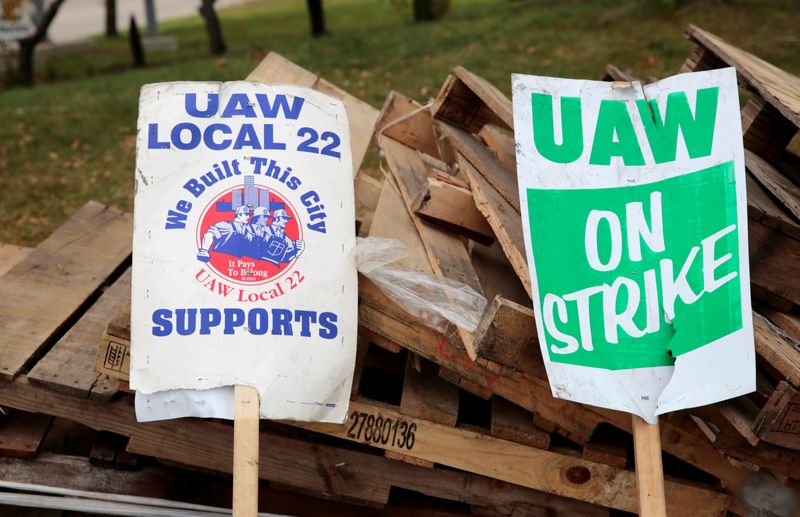By Dan Burns
(Reuters) -A walkout by more than 12,000 autoworkers on Friday could slow an outperforming U.S. economy should it drag on - even risking the first monthly net drop in payroll employment in nearly three years - but is unlikely on its own to trigger a recession.
Economists see the most immediate risk to activity concentrated in the auto sector itself, which only this year got back on its feet after two years when pandemic-related supply chain bottlenecks hampered vehicle output. With dealer inventories restrained, sales of new cars and trucks had slumped over much of that period even as consumer demand remained strong.
After failing to reach a deal on a new contract with Detroit's "Big Three" automakers General Motors (NYSE:GM), Ford (NYSE:F) and Stellantis (NYSE:STLA), the United Auto Workers union went on strike on Friday at three plants in three states. The stoppage for now affects about 12,700 hourly employees.
Should it widen in the weeks ahead to include all 146,000 UAW members at the three companies, it could become the largest automotive industry strike in a quarter century - since more than 150,000 GM workers went off the job for nearly two months in 1998.
That would put "at risk half a billion dollars per day in an economy that generates more than $26.7 trillion in goods and services each year, or more than $73 billion per day," RSM's chief U.S. economist Joe Brusuelas estimated this week.
RSM estimates the U.S. economy would suffer a modest 0.2% drag to annualized growth of gross domestic product this quarter should the strike action last for a month, Brusuelas said.
"While that amount is large in nominal dollar terms, it would not be large enough to tip the economy into recession. In the end, the impact of a such a strike would be modest compared to previous generations," Brusuelas said.
Other economists offered comparable estimates of the potential drag from a prolonged strike by the Big Three's full union membership.
RISK TO PAYROLLS
The U.S. economy this year has dodged what was a consensus expectation for falling into recession in the face of aggressive interest rate hikes by the Federal Reserve to rein in the highest inflation in four decades.
In fact, growth in GDP - the broadest measure of economic output - motored along at an above-trend rate of just above 2% annualized through the first six months of the year, and indicators of activity so far in the third quarter suggest it has accelerated further.
That said, activity in some sectors - manufacturing in particular - has recently slowed or even stalled, and a historically hot job market has cooled over the summer.
A full-blown strike "could push U.S. payroll growth temporarily negative," Michael Pearce, lead U.S. economist at Oxford Economics, wrote on Wednesday.
While this was the survey week for the Labor Department's monthly nonfarm payrolls report for September, the fact that union members were on the job for most of the week ahead of the walkout means they will be counted as employed for this month's report, Pearce said. That means any recorded knock to employment would likely not occur until October, should the strike last that long, and that would not be reported until early November.
The UAW walkout in June and July of 1998 resulted in a net drop of 136,000 jobs in the auto sector, BLS data shows, but with job growth at that time was averaging more than 270,000 a month, it was not enough to drag total employment growth into negative territory.
It may be a different story this time, however. In the three months through August, net payroll growth had slowed to an average of around 150,000 a month - from 430,000 a month over the summer of 2022 - so a full walkout poses the risk of the first net drop in U.S. payrolls since December 2020.
Pearce also estimated a full strike lasting a month could cut U.S. auto output by nearly a third, much as it did during the 1998 strike. That could knock monthly assembly rates back to near their lows from two years ago around this time when severe shortages of microchips and other components stifled Detroit's output.

In fact, the pace of production weakened in August before the strike, new data from the Fed showed on Friday hours after the walkout began. Assemblies of cars and light trucks fell by about 9% last month, the largest drop since the post-pandemic output low in September 2021.
The auto sector's slowdown was a significant drag on overall U.S. factory output last month, which notched only a fractional gain of 0.1%.